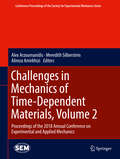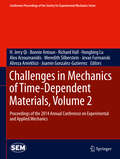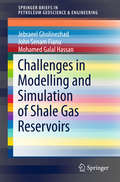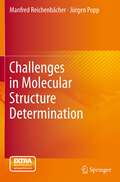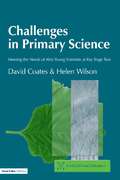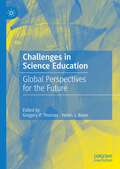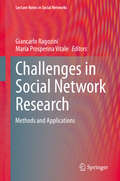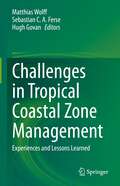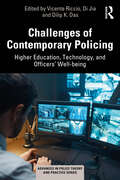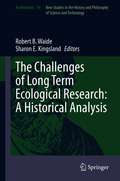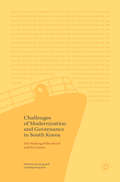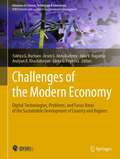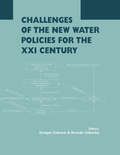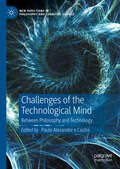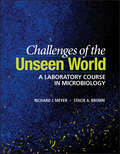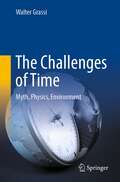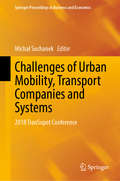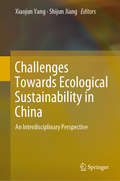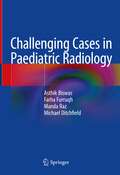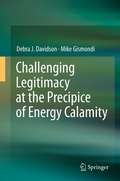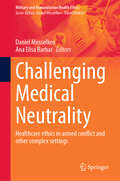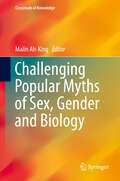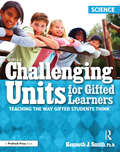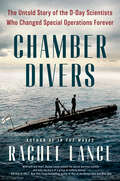- Table View
- List View
Challenges in Mechanics of Time-Dependent Materials, Volume 2: Proceedings Of The 2014 Annual Conference On Experimental And Applied Mechanics (Conference Proceedings of the Society for Experimental Mechanics Series)
by Alex Arzoumanidis Meredith Silberstein Alireza AmirkhiziChallenges in Mechanics of Time-Dependent Materials, Volume 2 of the Proceedings of the 2018 SEM Annual Conference& Exposition on Experimental and Applied Mechanics, the second volume of eight from the Conference, brings together contributions to this important area of research and engineering. The collection presents early findings and case studies on fundamental and applied aspects of Experimental Mechanics, including papers in the following general technical research areas: Characterization Across Length Scales Extreme Environments & Environmental Effects Soft Materials Damage, fatigue and Fracture Inhomogeneities & Interfaces Viscoelasticity Research in Progress
Challenges in Mechanics of Time-Dependent Materials, Volume 2: Proceedings of the 2014 Annual Conference on Experimental and Applied Mechanics (Conference Proceedings of the Society for Experimental Mechanics Series #37)
by Richard Hall Bonnie Antoun Hongbing Lu H. Jerry Qi Alireza Amirkhizi Jevan Furmanski Alex Arzoumanidis Meredith Silberstein Joamin Gonzalez-GutierrezChallenges in Mechanics of Time-Dependent Materials, Volume 2: Proceedings of the 2014 Annual Conference on Experimental and Applied Mechanics, the second volume of eight from the Conference, brings together contributions to this important area of research and engineering The collection presents early findings and case studies on fundamental and applied aspects of Experimental Mechanics, including papers in the following general technical research areas: Metallic, Polymeric and Composite Materials o Effects of Extreme Environments including Radiation Resistance, Damage, and Aging o Challenges in Time-dependent Behavior Modeling of Low, Moderate and High Strain Rates o Effects of Inhomogeneities on the Time-Dependent Behavior o Time dependent granular materials · Composite, Hybrid and Multifunctional Materials o Challenges in Time-dependent Behavior Modeling Viscoelastoplasticity and Damage o Effects of Interfaces and Interphases on the Time-Dependent Behavior · Mechanics of materials from advanced manufacturing, such as additive manufacturing o Property characterization from AM o Process modeling and simulations of AM o Material design using AM · Time-dependent and Small-scale Effects in Micro/Nano-scale Testing
Challenges in Modelling and Simulation of Shale Gas Reservoirs (Springerbriefs In Petroleum Geoscience And Engineering Ser.)
by Jebraeel Gholinezhad John Senam Fianu Mohamed Galal HassanThis book addresses the problems involved in the modelling and simulation of shale gas reservoirs, and details recent advances in the field. It discusses various modelling and simulation challenges, such as the complexity of fracture networks, adsorption phenomena, non-Darcy flow, and natural fracture networks, presenting the latest findings in these areas. It also discusses the difficulties of developing shale gas models, and compares analytical modelling and numerical simulations of shale gas reservoirs with those of conventional reservoirs. Offering a comprehensive review of the state-of-the-art in developing shale gas models and simulators in the upstream oil industry, it allows readers to gain a better understanding of these reservoirs and encourages more systematic research on efficient exploitation of shale gas plays. It is a valuable resource for researchers interested in the modelling of unconventional reservoirs and graduate students studying reservoir engineering. It is also of interest to practising reservoir and production engineers.
Challenges in Molecular Structure Determination
by Jürgen Popp Manfred ReichenbächerTaking a problem-based approach, the authors provide a practice-oriented and systematic introduction to both organic and inorganic structure determination by spectroscopic methods. This includes mass spectrometry, vibrational spectroscopies, UV/VIS spectroscopy and NMR as well as applying combinations of these methods. The authors show how to elucidate chemical structures with a minimal number of spectroscopic techniques. Readers can train their skills by more than 400 problems with varying degree of sophistication. Interactive Powerpoint-Charts are available as Extra Materials to support self-study.
Challenges in Primary Science: Meeting the Needs of Able Young Scientists at Key Stage Two (A\nace/fulton Publication Ser.)
by David Coates Helen WilsonThis practical and easy-to-use book enables teachers to challenge able children to develop their potential and to extend their thinking in primary science. It links theory to practice to develop understanding of what it means to be an able scientist; and empowers teachers to build on their existing good practice to build an inclusive science curriculum for able children. Special features include: photocopiable resources that are linked to the National Curriculum and the QCA schemes of work; teacher guidance on the use of these resources and how they can be incorporated into normal primary science lessons; and suggestions for assessment.
Challenges in Science Education: Global Perspectives for the Future
by Gregory P. Thomas Helen J. BoonThis edited volume focuses on challenges facing science education across three areas: curriculum, teacher education, and pedagogy. Integrating a diverse range of perspectives from both emerging and established scholars in the field, chapters consider the need for measured responses to issues in society that have become pronounced in recent years, including lessons from the Covid-19 pandemic, the environment, and persisting challenges in STEM teaching and learning. In doing so, the editors and their authors chart a potential course for existing and future possibilities and probabilities for science education.
Challenges in Social Network Research: Methods and Applications (Lecture Notes in Social Networks)
by Giancarlo Ragozini Maria Prosperina VitaleThe book includes both invited and contributed chapters dealing with advanced methods and theoretical development for the analysis of social networks and applications in numerous disciplines. Some authors explore new trends related to network measures, multilevel networks and clustering on networks, while other contributions deepen the relationship among statistical methods for data mining and social network analysis. Along with the new methodological developments, the book offers interesting applications to a wide set of fields, ranging from the organizational and economic studies, collaboration and innovation, to the less usual field of poetry. In addition, the case studies are related to local context, showing how the substantive reasoning is fundamental in social network analysis. The list of authors includes both top scholars in the field of social networks and promising young researchers. All chapters passed a double blind review process followed by the guest editors. This edited volume will appeal to students, researchers and professionals.
Challenges in Tropical Coastal Zone Management: Experiences and Lessons Learned
by Matthias Wolff Sebastian C. A. Ferse Hugh GovanThis book focuses on tropical coasts, which are highly vulnerable due to a multitude of stressors. Population growth is substantial, habitats are lost and biodiversity is reduced at an alarming rate, severely affecting many ecosystem services. This situation calls for sound coastal management and the effective engagement of all relevant stakeholders. About two decades ago the M.Sc. program ISATEC (International Studies in Aquatic Tropical Ecology) was created at Bremen University (Germany) to train young scientists for a professional engagement in the complex field of tropical coastal and resource management. This book provides a platform for those Alumni to report on their work experiences and findings in their home countries and covers all regions of the tropical belt. Part I of the book provides a short review of the state of the tropical ocean and its resources and of international attempts towards sustainable ocean management starting with the Rio Declaration on Environment and Development in 1992. Part II deals with country case studies, and part III focuses on an evaluation & synopsis of those contributions. Emerging key issues for management and conservation of the tropical coastal environments are presented and critical challenges on the path towards reaching the Sustainable Development Goals (SDGs) are discussed, as are the needs for enhancing research and capacity development.
Challenges of a Rechargeable Magnesium Battery: A Guide to the Viability of this Post Lithium-Ion Battery (SpringerBriefs in Energy)
by Claudiu B. BucurThis expert volume addresses the practical challenges which have so far inhibited the commercial realization of a rechargeable magnesium battery, placing the discussion within the context of the already established lithium-ion battery. Lithium-ion batteries are becoming commonplace in most power applications, starting with portable electronics and expanding to motor vehicles, stationary storage, and backup power. Since their introduction 25 years ago, they have slowly been replacing all other battery chemistries. As the technology has matured, it is nearing its theoretical limits in terms of energy density, so research and development worldwide is quickly shifting towards the study of new battery chemistries with cheaper components and higher energy densities. A very popular battery candidate which has generated a lot of recent interest is the magnesium rechargeable battery. Magnesium is five orders of magnitude more abundant than lithium, can move two electron s per cation, and is known to plate smoothly without any evidence of dendritic growth. However, many challenges remain to be overcome. This essential volume presents an unfiltered view on both the realistic promises and significant obstacles for this technology, providing key insights and proposed solutions.
Challenges of Contemporary Policing: Higher Education, Technology, and Officers’ Well-Being (Advances in Police Theory and Practice)
by Vicente RiccioThis edited collection reflects contemporary challenges faced by police forces across the globe and the role of technology in addressing them. The use of science and technology raises questions about ethics, training, the well-being of people, and freedom. New technologies promise to foster police practices based on intelligence, accuracy, and preparedness, and are considered necessary to overcome challenges such as declining budgets, lack of personnel, and legitimacy. However, technologies can also be used for authoritarian and nefarious purposes. For those reasons, this book aims to discuss related topics from various contexts to establish connections among common problems in the field of policing across the globe. This book provides an internationally relevant assessment of the use of technology in the field of policing, as well as the impact on training and police well-being. It is ideal for an academic audience at both graduate and undergraduate levels in the fields of criminal justice studies, police studies, legal sociology, and public policy, and will be of interest to police practitioners, legal professionals, social service workers, and public-sector managers.
The Challenges of Long Term Ecological Research: A Historical Analysis (Archimedes #59)
by Robert B. Waide Sharon E. KingslandThis volume explores the challenges of sustaining long-term ecological research through a historical analysis of the Long Term Ecological Research Program created by the U.S. National Science Foundation in 1980. The book examines reasons for the creation of the Program, an overview of its 40-year history, and in-depth historical analysis of selected sites. Themes explored include the broader impact of this program on society, including its relevance to environmental policy and understanding global climate change, the challenge of extending ecosystem ecology into urban environments, and links to creative arts and humanities projects. A major theme is the evolution of a new type of network science, involving comparative studies, innovation in information management, creation of socio-ecological frameworks, development of governance structures, and formation of an International Long Term Ecological Research Network with worldwide reach. The book’s themes will interest historians, philosophers and social scientists interested in ecological and environmental sciences, as well as researchers across many disciplines who are involved in long-term ecological research.
Challenges of Modernization and Governance in South Korea
by Jae-Jung Suh Mikyoung KimFocusing on the sinking of the Sewol, a commercial ferry which capsized off the South Korean coast in April 2014, this book considers key issues of disaster, governance, civil society and the ideational transformation of human agents and their empowerment. Providing a lens through which to re-examine South Korean institutions, laws and practices, the volume examines the impact of the Sewol incident and what it reveals about the fault lines of South Korean society and governance. It addresses the repercussions of South Korea’s turn to a liberal democracy and neoliberal economy and reflects on the multilayered implications of the disaster in respect to the potential human costs of the country’s state-driven development policy and high stress modernisation. The book also highlights the relevance of the Korean experience for other societies on a similar developmental trajectories and facing similar challenges.
Challenges of the Modern Economy: Digital Technologies, Problems, and Focus Areas of the Sustainable Development of Country and Regions (Advances in Science, Technology & Innovation)
by Yakhya G. Buchaev Arsen S. Abdulkadyrov Julia V. Ragulina Arutyun A. Khachaturyan Elena G. PopkovaThe book focuses on a systemic study of the challenges of the modern economy and related problems and areas of sustainable development of countries, regions, and businesses, with particular attention paid to the new prospects offered by the spread of digital technology. The book’s contribution to the literature is that it reveals the specifics and digital perspectives of supporting the SDGs in the economy at every level of the economy: country, regional, and corporate, considering sectoral specificities—this is reflected in six parts of the book. Part 1 identifies contemporary challenges of the modern economy as barriers to sustainable development. Part 2 reflects the future direction of sustainable development of the countries. Part 3 considers the problems and prospects for sustainable development of regions. Part 4 focuses on the problems and prospects for the sustainable development of enterprises and industries. Part 5 sheds light on the economic and legal foundations and cooperative mechanisms of sustainable development. Part 6 offers recommendations for enhancing the use of digital technologies offered by Industry 4.0 to support the SDGs. Scientists whose research interests include sustainable economic development are the primary target audience for this book. For the primary target audience, the book forms a systemic view of the global challenges of sustainable development and offers a set of scientific and methodological recommendations to provide an effective response to these challenges at every level of the economy. An additional audience for the book is practicing experts, who will find international best practices and applied recommendations to support sustainable economic development and implementation of the SDGs in the practice of state (national regulation and public administration of the region) and corporate (in various industries) management.
Challenges of the New Water Policies for the XXI Century: Proceedings of the Seminar on Challenges of the New Water Policies for the 21st Century, Valencia, 29-31 October 2002
by Enrique Cabrera Ricardo CobachoThe concept of sustainable development appeared almost twenty years ago, adapting traditional policies to new circumstances, and promoting progress capable of satisfying the necessities of both present and future generations. It is widely believed that the need for a proper and sustainable management of water will be a problem which
Challenges of the Technological Mind: Between Philosophy and Technology (New Directions in Philosophy and Cognitive Science)
by Paulo Alexandre e CastroThis book presents a set of texts that reflect different approaches to the relationship between mind and technology. In today’s increasingly technological world, a myriad of different and dizzying challenges face humanity: the ever-closer relationship between man and machine, the exponential development of Artificial Intelligence, man's relationship with virtual worlds, the relationship with new realities such as the neuro potentiation of his capacities, the appearance of robots in everyday life, and so on. In this volume, renowned world specialists explore these concerns, and discuss limitations and possible problems surrounding the interaction of man and machine. The book provides a well-researched, thought-provoking analysis of the need to rethink the theory of the mind, proposing relevant answers to pressing questions and raising new questions that need to be considered.
Challenges of the Unseen World: A Laboratory Course in Microbiology (ASM Books)
by Richard Meyer Stacie BrownSolving real-world health challenges in a learning environment You are at an exciting gateway into the world of microorganisms. With nothing more than basic lab equipment such as microscopes, Petri dishes, media, and a handful of reagents, you will learn to isolate, grow, and identify bacteria that live all around us. This is no ordinary microbiology laboratory course; not only will you learn how to streak plates, use a microscope, perform a Gram stain, and prepare serial dilutions and spread plates—fundamental skills found in every microbiologist's toolkit—you will solve a series of public health–related challenges that many professional microbiologists encounter in their work. By the end of this course, you will: Determine the origin of a nosocomial infection. Using foundational and molecular methods, you will determine whether the infections occurring in hospitalized patients are the result of contaminated medical items. Select the antibiotic to treat a patient with Crohn's disease. You will find minimum inhibitory concentrations of various antibiotics for a Pseudomonas strain associated with Crohn's disease. Pinpoint the source of lettuce contaminated with E. coli. Using molecular tools you will investigate a common food safety challenge, antibiotic-resistant E. coli and the potential for spread of this resistance in the environment. Find the farm releasing pathogens into a stream used for drinking water. Using bacteriophage load in water samples, you will locate the source of fecal contamination in the water supply of a village in an underdeveloped country. Evaluate the potential of bacteria to cause a urinary tract infection. You will test for biofilms, quorum sensing behavior, and chemotaxis and assess which disinfectants would be most effective for sanitizing contaminated surfaces. Microbiology educators and researchers Richard Meyer and Stacie Brown have created this hands-on, engaging introduction to the essential laboratory skills in the microbial sciences that is sure to change the way you view the world around you.
The Challenges of Time: Myth, Physics, Environment
by Walter GrassiThis book represents a journey through the history of science in regards to the concept of time, specifically, the question as to whether it is absolute, relative, or irreversible. The best-known contribution, or at least the most popular one, came from Einstein. He took the illusion that time was universal, a concept dating back, essentially, to Galileo and Newton, and shattered it, both within and without the scientific community. Thermodynamics teaches us that time has a preferential direction, i.e., forward, and is irreversible, as shown by Prigogine and his theories on dissipative structures and complex systems. Time is not only an “external spectator” to what happens, but assiduously takes part in making it happen. The concept of thermodynamics shows us how time is linked with environmental issues, as creator and destroyer. The author explores the relationships of cause and effect and how it can help in measuring the various eras of the planet, as well as understanding the beings that inhabit it. This book will be a valuable read for students, researchers, and interested laypersons alike.
Challenges of Urban Mobility, Transport Companies and Systems: 2018 TranSopot Conference (Springer Proceedings in Business and Economics)
by Michał SuchanekThis proceedings volume examines individual city transports, transport companies and entire transport systems. Featuring select contributions presented at the 2018 TranSopot Conference in Sopot, Poland, this book provides an analysis of transportation solutions both at the micro-level (single city or single company) as well as the macro-level (whole transportation systems). The enclosed research and case studies provide a theoretical background for transport analysis but also new innovative and sustainable solutions to transportation while also increasing the efficiency of transport operations. Transportation is a very specific area of social and economic life. It creates countless opportunities and fulfills the need for mobility while also generating significant cost—direct for the company or indirect to societies. Planning and organizing transport is a task which requires a multi-level approach with a focus on operational, ecological and financial aspects. At a time in which many transport systems are unable to grow extensively due to lack of space or increased cost, these activities are even more crucial. The enclosed research from researchers, scholars and practitioners provides not only new theories but also empirical data and practical experience. The TranSopot 2018 conference is a continuation of a long series of conferences devoted to the topic of transport sector development. The goal of the conference is to exchange current trends and spread the results of current research into the fields of transport growth, development and management.
Challenges Towards Ecological Sustainability in China: An Interdisciplinary Perspective
by Xiaojun Yang Shijun JiangThis book includes a selection of the best papers presented at the Jinan Forum on Geography and Ecological Sustainability held in Guangzhou, China, from 17 to 19 February 2017, as well as several invited papers. It discusses concepts, methods, and applications in geography and ecology with an emphasis on various issues challenging ecological sustainability in China. Chapters are written by leading scholars and researchers from a variety of disciplines including geography, ecology, environmental science and policy, and economics. Case studies are predominantly drawn from Southern China, where nearly four decades of dramatic urbanization has caused economic and ecological strains on land and people.This book will appeal to a wide readership including researchers, upper-division undergraduate and graduate students, and professionals in the fields of sustainability science, geography, ecology, and environmental science and policy.
Challenging Cases in Paediatric Radiology
by Asthik Biswas Farha Furruqh Manda Raz Michael DitchfieldThe book covers challenging clinical radiological cases spanning the central nervous system, respiratory and cardiovascular systems, gastrointestinal system, genitourinary system, musculoskeletal system, as well as multi-organ cases in paediatric patients. Each case includes pathognomonic images followed by a quiz to test the reader and a discussion of the case with a focus on key diagnostic features to help the reader recognise the case in working and examination environments. It combines the expertise of radiology consultants and trainees in order to provide pertinent information conducive to better clinical practice and focused specialty exam preparation in paediatric radiology
Challenging Legitimacy at the Precipice of Energy Calamity
by Mike Gismondi Debra J. DavidsonHuman history has often been described as a progressive relinquishment from environmental constraints. Now, it seems, we have come full circle. The ecological irrationalities associated with industrial societies have a lengthy history, and our purpose in the proposed book is not to catalogue this litany of wrongs. Rather, this book is about political responses to global environmental crisis at a crucial turning point in history, by focusing on the political discourses surrounding the tar sands in Alberta, Canada.
Challenging Medical Neutrality: Healthcare ethics in armed conflict and other complex settings (Military and Humanitarian Health Ethics)
by Daniel Messelken Ana Elisa BarbarIn this volume, the concept of "medical neutrality," which states that medical services should not be interfered with during armed conflicts and other emergencies, is challenged based on the experience and expertise of the authors, who come from diverse military, humanitarian, and academic backgrounds. The principle of medical neutrality is grounded in International Humanitarian Law as well as in Human Rights Law and it can be justified by ethical rationales such as the principle of Humanity and ordinary medical ethics. Health workers often understand medical neutrality as an obligation not to engage in anything else other than medical outcomes. In this book, a variety of problems and ethical issues in the application of medical neutrality in the professional practice of healthcare personnel are analyzed. The contributors expand the debate around “medical neutrality” and aim at better-informing policy and operational decisions regarding the application of medical ethics, the protection of medical missions in conflict, and the training of healthcare professionals to operate ethically and safely in volatile environments. The volume is of great interest to academics, practitioners, policymakers, and students who are looking for analyses and guidance regarding medical neutrality.
Challenging Popular Myths of Sex, Gender and Biology (Crossroads of Knowledge #1)
by Malin Ah-KingThis edited volume challenges popular notions of sex, gender and biology and features international, trans-disciplinary research. The book begins with an exploration of supposedly 'natural' sexual differences, then looks at research in evolutionary biology and examines topics such as gender stereotypes in humans. The first chapters explore important questions: What are the fundamental sex differences? How do genes and hormones influence an individual's sex? Subsequent chapters concern topics including: sex stereotypes in the field of sexual conflict, how the focus on genes in evolutionary biology disregards other means of inheritance, and the development of Darwin's theory of sex differences. The last three chapters look at humans, discussing: an interdisciplinary approach to the evolution of sex differences in body height, biological versus social constructive perspectives on the gendering of voices and nature-culture arguments in the current political debate on paternity leave in Norway.
Challenging Units for Gifted Learners: Teaching the Way Gifted Students Think (Science, Grades 6-8)
by Kenneth J. SmithGifted students have the potential to learn material earlier and faster, to handle more abstraction, and to solve complex problems better. This potential, however, needs stimulating experiences from home and school or it will not unfold. These books are designed to help teachers provide the engaging curricula that will nurture this potential in school. The Science book includes a medical simulation in which teams of students work as doctors to diagnose patients' cases, a food science project in which students use a variety of information-gathering techniques to learn how nutrition impacts performance, a hands-on study of human memory and expertise, and a study of the physics of sports.Grades 6-8
Chamber Divers: The Untold Story of the D-Day Scientists Who Changed Special Operations Forever
by Rachel LanceThe previously classified story of the eccentric researchers who invented cutting-edge underwater science to lead the Allies to D-Day victoryIn August 1942, more than 7,000 Allied troops rushed the beaches of Normandy, France, in an all but-forgotten landing. Only a small fraction survived unscathed. It was two summers before D-Day, and the Allies realized that they were in dire need of underwater intelligence if they wanted to stand a chance of launching another beach invasion and of winning the war.Led by the controversial biologists J. B. S. Haldane and Dr. Helen Spurway, an ingenious team of ragtag scientists worked out of homemade labs during the London Blitz. Beneath a rain of bombs, they pioneered thrilling advances in underwater reconnaissance through tests done on themselves in painful and potentially fatal experiments. Their discoveries led to the safe use of miniature submarines and breathing apparatuses, which ultimately let the Allies take the beaches of Normandy.Blast injury specialist Dr. Rachel Lance unpacks the harrowing narratives of these experiments while bringing to life the men and women whose brilliance and self-sacrifice shaped the outcome of the war, including their personal relationships with one another and the ways they faced skepticism and danger in their quest to enable Allied troops to breathe underwater.The riveting science leading up to D-Day has been classified for generations, but Chamber Divers finally brings these scientists&’ stories—and their heroism—to light.
